LED Technology and its future in display lighting
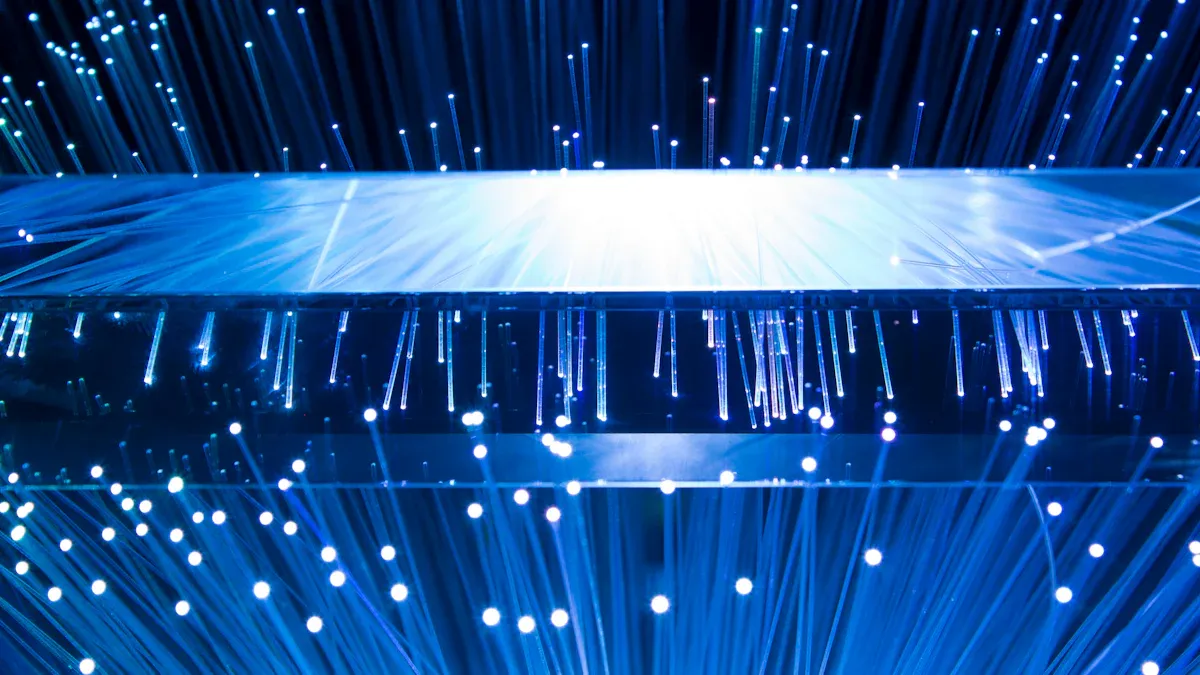
You see LED technology changing how you see display lighting every day. More people use LEDs in outdoor, indoor, commercial, and home places now.
Sector | Projected Adoption by 2030 (%) | |
|---|---|---|
Outdoor | 51.4 | 87 |
Indoor | 29.8 | 87 |
Commercial | 53 | 92 |
Residential | 47 | 78 |
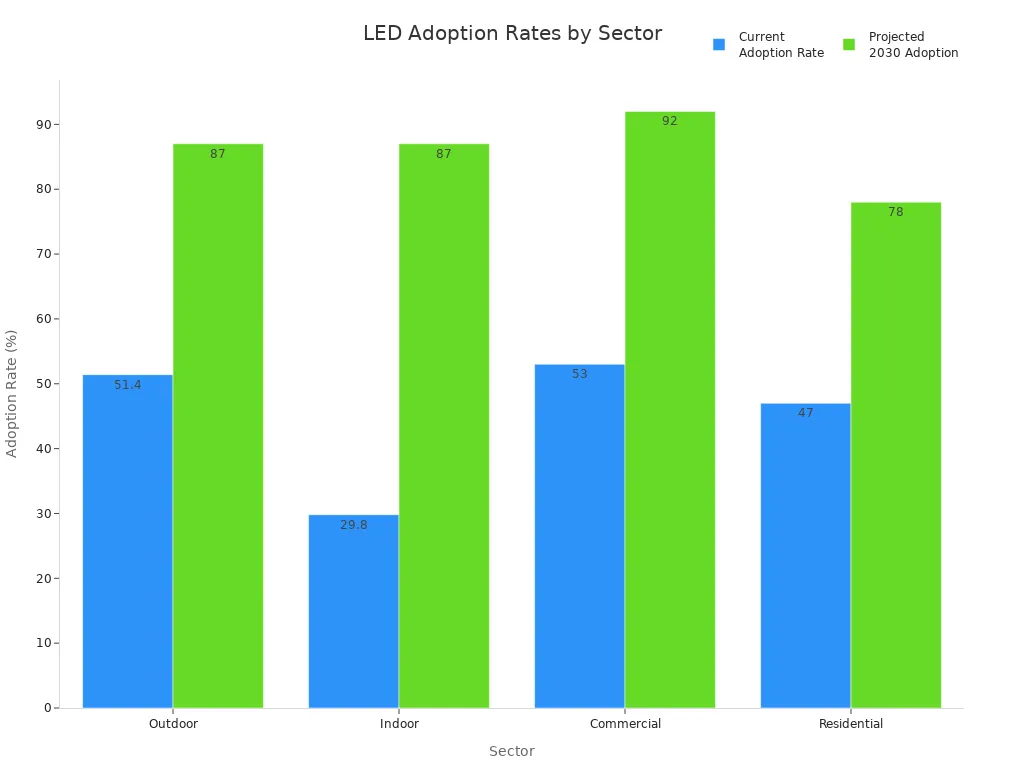
You see energy savings and new features too. Today’s lights show better colors and can be changed to fit your needs. They can connect to smart devices.
Smart lighting systems are liked by people who enjoy technology.
More people want lights they can change themselves.
Some lights help your health, like circadian systems.
Better looks and mood make your space nicer.
The future of display lighting will use technology that fits what you want. It will give good value and help homes and businesses for a long time.
Key Takeaways
LED lighting uses less energy and saves money. It lasts longer than old lights. This means you pay less for electricity. There is also less trash from used lights.
Smart LED systems are easy to use and can be changed. You can change the brightness and color with your phone or voice. This makes your space more comfortable and saves energy.
Human-centric lighting helps people feel better. It changes to match your daily habits. This can help you feel more awake or calm when you need it.
New technology like micro-LED and mini-LED gives better pictures. They use less power and last longer. This makes them great for new screens.
Picking eco-friendly LED products helps the planet. Many LEDs are made with safe materials. They can also be recycled, which is good for nature.
LED Technology in Modern Displays
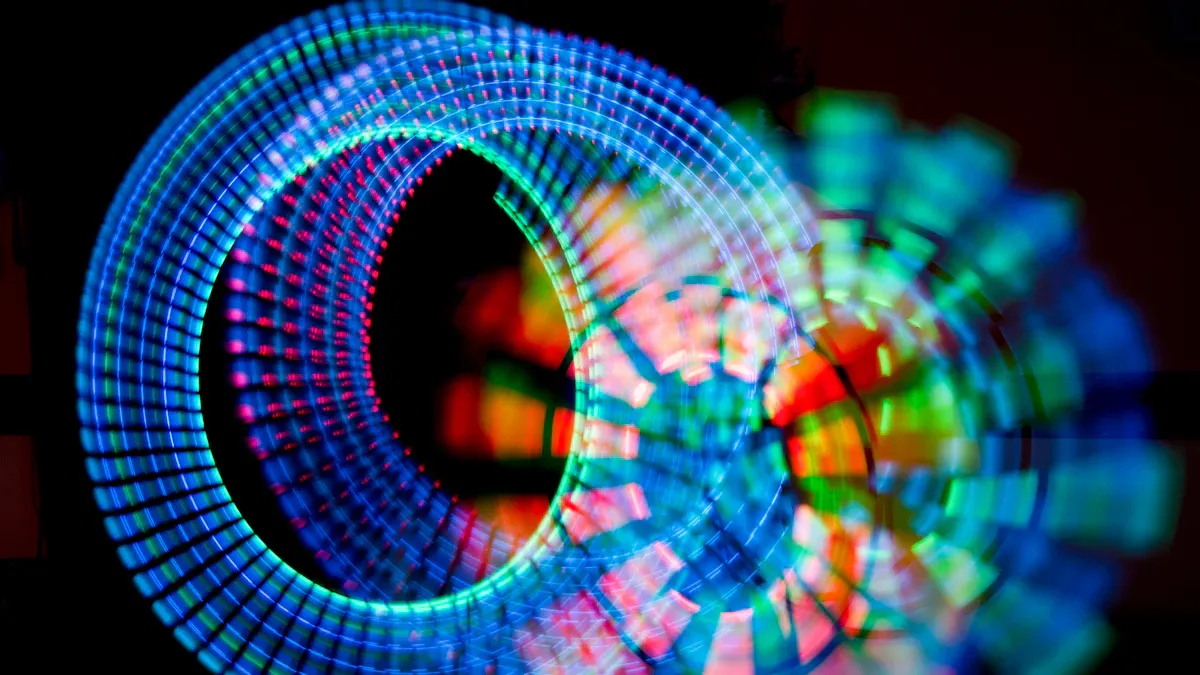
Energy Efficiency and Performance
LED technology is changing how we use lights. When you pick LED lighting, you get more than just brightness. You save energy and get strong results. Modern LED displays use less power than old lights. Mini LED displays use much less energy than CRT displays. This helps you save money on your electric bill. It also helps the environment.
Metric | LED Display | Traditional Lighting |
|---|---|---|
Average Lifespan (hours) | 15,000 | |
Annual Energy Use (1000lm) | 500 kWh | 1,200 kWh |
Color Consistency (% degradation) | <5% at 50k | 35% at 10k |
LED lighting lasts much longer than old lights. You do not have to change bulbs as often. This means you make less waste and spend less money. LED displays work better too. They stay bright and clear, even in sunlight. In the last five years, LED technology got 40% more energy efficient. You get lighting you can trust in many places.
Color Rendering Advancements
You want your lights to show real colors. LED lighting now uses new ways to make colors look better. With things like quantum dots and new phosphors, colors look more true and are easier on your eyes.
Improvement Method | Description | Impact on Visual Quality |
|---|---|---|
Quantum Dots | Use of red quantum dots as color conversion materials to enhance CRI. | Increases color accuracy and visual comfort. |
Advanced Phosphors | Adoption of green and red phosphors instead of single-component yellow phosphor. | Secures good color rendering properties, improving overall visual quality. |
You can choose LED lighting with different color rendering index (CRI) numbers. High-end displays use a CRI of 90, which is good for art or stores. Most lights use a CRI of 80. Basic lights use a CRI of 70. You can pick the best light for what you need.
LED technology gives you control, saves energy, and makes lighting better for every place. You will see the difference at home, at school, or at work.
LED Lighting Capabilities
Brightness and Reliability
You want your screen to look bright and clear. LED lighting gives strong brightness in any place. The LED can change its brightness to match the room. If you use a screen outside, the LED keeps images sharp. Good LED quality helps it stay bright for a long time. You get lighting that does not fade fast.
Factor | Description |
|---|---|
Ambient Light | LED screens must match the light around them to look good. |
Light Intensity | Bright rooms need brighter LEDs for clear pictures. |
Contrast | High contrast makes images look better in bright places. |
Quality and Structure of LEDs | Good LEDs stay bright and last longer, so they work well over time. |
LED lights are tested for thousands of hours. This makes sure they last a long time. Strong materials and smart designs protect LEDs from heat and water. Some LED lamps last much longer than old ones. Companies save money because they do not replace lights as often. You get lights that last longer and need less work.
Makers use the LM-84-14 test for LED modules, testing them for over 9,000 hours.
Good heat control and power protection help LEDs work well.
Sealed and rust-proof designs help LEDs last in wet places.
Better LED designs lower replacement costs by 20%.
Cost and Affordability
You save money when you pick LED lighting. LED bulb prices dropped from $40 in 2010 to under $3 in 2023. This makes LEDs easy to buy for home or work. LEDs use less power, so your bills are lower. You also spend less on fixing and changing bulbs.
Lighting Type | Capital Expenditure (CapEx) | Operational Expenditure (OpEx) (per month) | Total Cost After 10 Months | Total Cost After 2 Years | Total Cost After 5 Years |
|---|---|---|---|---|---|
LEDs | $1000 | $100 | $2000 | $3400 | $7000 |
HID | $200 | $200 | $2200 | $5000 | $12000 |
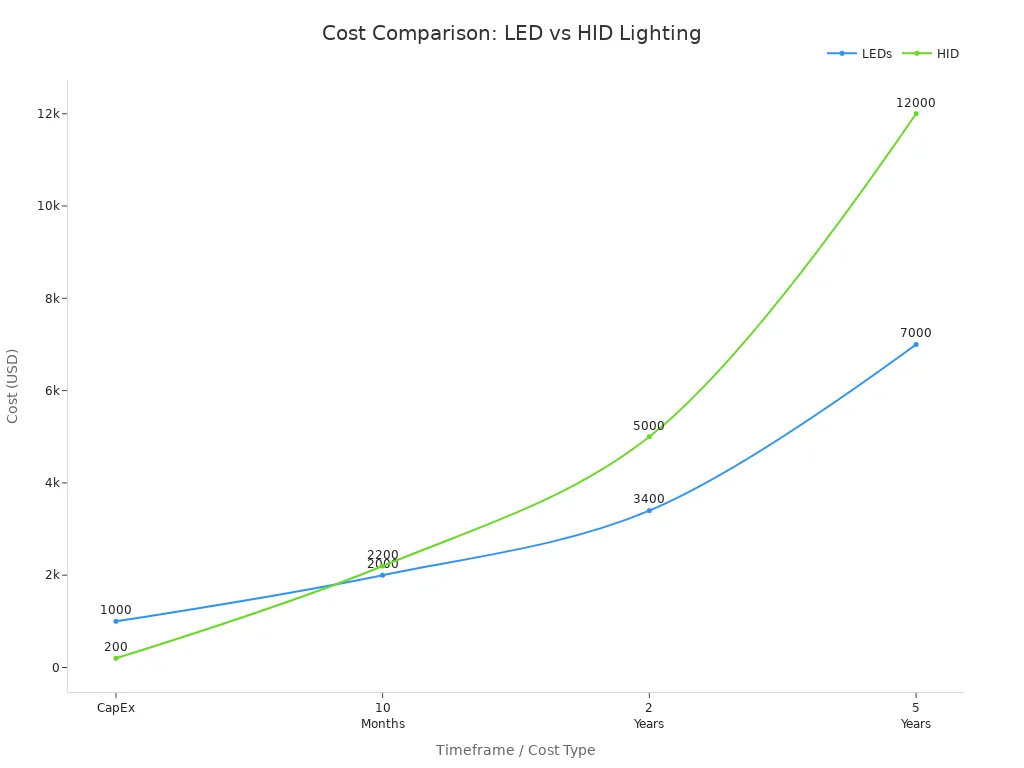
LED lighting gives you more value because it lasts longer and uses less energy. You get better efficiency and lower costs over time. You see savings in your bills and change bulbs less often.
LED lighting is now cheap for most people.
You save energy and money every month.
LED lighting works well and lasts longer.
Innovations in LED Displays
Micro-LED and Mini-LED
Micro-LED and mini-LED are changing display lighting. These new led technology types work better and use less energy. Micro-LEDs are very small, less than 100 microns wide. Each pixel lights up by itself. This makes blacks look deep and colors look bright. Mini-LEDs are a little bigger, between 100 and 200 microns. They use a backlight with many small leds.
Here is a table to show the differences:
Feature | Micro-LED | Mini-LED | Traditional LED |
|---|---|---|---|
Size | Less than 100 microns | 100–200 microns | Larger |
Brightness | Up to 30 times brighter than OLED | Excellent brightness | Good, but less advanced |
Lifespan | Up to 100,000 hours | Usually 50,000 hours | Shorter |
Durability | More fragile, needs care | More durable | Durable |
Image Quality | High pixel density, high contrast | Bright, accurate colors | Standard |
Cost | More expensive | More affordable | Most affordable |
Energy Efficiency | Needs less power for brightness | Better than old LED-LCDs | Standard |
Micro-LEDs give you better control over contrast and brightness. Each pixel can turn on or off by itself. This means you see true blacks and sharp pictures. Micro-LEDs last longer and do not get burn-in like some other screens. Mini-LEDs use local dimming zones to help with brightness. Sometimes, you might see halos around bright spots. Both types use less energy than older led lighting. This helps you save power and money.
New discoveries make these displays even better. Companies now use silicon-based micro-LED chips in many areas. New patents for micro-LED wafers and mass transfer make building displays easier. Full-color micro-LEDs are almost ready for mass production. You will see them in more products soon. China is leading in RGB-mini LED technology. This shows how fast this field is growing.
Micro-LED and mini-LED displays give you better pictures, last longer, and use less energy. You get a display that looks great and saves power.
Human-Centric and Smart Lighting
You want lighting that helps you feel good and work better. Human-centric lighting uses led technology to match your body’s needs. It changes color and brightness during the day. This helps your mood and helps you focus. In the morning, cool and bright led lighting wakes you up. Later, warmer lights help you relax and not feel tired.
Human-centric lighting in offices helps people work better and feel good.
At home, it helps you feel cozy and supports your sleep.
Tunable white technology lets you pick the color you want.
Smart led lighting systems make life easier. You can control your lights with your voice, a phone app, or motion sensors. You can set times for your lights to turn on or off. Smart leds adjust to natural light, saving energy and lowering bills. They also help keep your home safe by turning on when they sense movement.
Voice commands let you control lights without touching anything.
You can change lighting from anywhere with remote control.
Motion sensors turn lights on only when needed, saving energy.
Smart leds can work with security systems for extra safety.
Smart led lighting gives you comfort, control, and helps you save energy. You get lighting that fits your life and keeps you feeling good.
Connectivity and Customization
You want lighting that fits your style and needs. New led technology lets you change your lighting in many ways. Smart led lighting connects to your phone, voice assistant, or home system. You can change colors, brightness, and set scenes for different moods.
Trend | Description |
|---|---|
Advanced Controls | Sensors and AI change lighting based on people and daylight. |
Customization and Aesthetics | Custom led fixtures let you make cool looks for your space. |
Smart LED Systems | Control your lights from your phone or with your voice. |
Energy Efficiency | Sensors and timers save energy by turning off lights when not needed. |
Home Automation Integration | Lights work with other smart devices for a smooth experience. |
Color Changing Capabilities | Change colors and scenes to match your mood or activity. |
In stores, custom led lighting makes products look better and the space feel nice. In your home office, it helps you feel good and keeps your eyes from getting tired. You can use daylight harvesting to save energy and keep your space bright.
Application Type | Impact on Aesthetics | Impact on Functionality |
|---|---|---|
Commercial (Retail) | Makes stores look nice and helps people see products | Works with dimmers and saves energy |
Residential (Office) | Makes your space feel better and more comfy | Uses daylight harvesting and helps your eyes |
With smart leds and new led technology, you get lighting that is easy to use, saves energy, and matches your style. The future of display lighting is bright, smart, and made for you.
Sustainability and Future-Proof Lighting
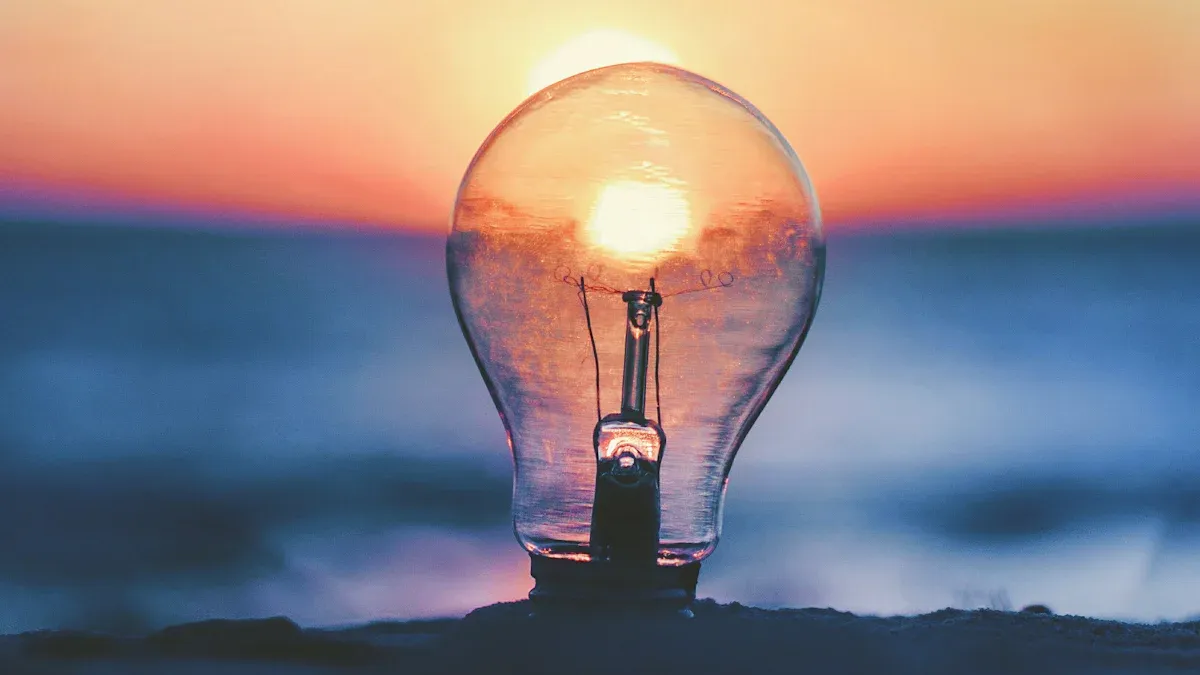
You want lights that help the planet and last long. Picking led lighting helps you build a system that is good for the earth. Many companies use safe materials to make led products. These materials are better for recycling.
Eco-Friendly Materials
More led lights use materials that protect nature. AEON led lights do not have harmful chemicals. You can recycle almost all their parts. MEGAMAN led lamps use aluminum and plastic that you can recycle. Their boxes are made from recycled paper. These choices help you make less trash and keep bad things out of landfills.
AEON led lights do not have toxic chemicals.
MEGAMAN led lamps use aluminum and plastic you can recycle.
Boxes use recycled paper.
Led lighting is much better for the earth than old lights. Here is a table to show the differences:
Aspect | LED Lighting | Traditional Lighting |
|---|---|---|
Lifespan | 25,000 to 50,000 hours | About 1,000 hours |
Energy Consumption | Uses much less than halogens | Uses more energy |
CO2 Emissions per year | About 450 pounds | Up to 4,500 pounds |
Toxic Materials | None | Has mercury |
Waste Generation | Makes much less waste | Makes more waste |
You help nature by picking led lighting with safe materials. You also save money because these lights last longer and use less power.
Integration with Renewable Energy
You can make your lights even greener by using clean energy. Led lighting works well with solar and wind power. It needs very little energy. Solar led street lights work without the power grid. This makes cities cleaner. Wind-powered led lighting works well even when the wind changes.
Method | Benefit |
|---|---|
LED Lighting with Solar | |
LED Lighting with Wind | Works well even when wind is not steady. |
You see led lighting in parks, streets, and homes that use clean energy. This helps you pay less for power and makes less pollution. Starbucks saved $4 million each year by using led lighting. You can get tax breaks and rebates for using energy-saving lights. Led lighting uses up to 75% less energy than old lights. You spend less on repairs because they last up to 100,000 hours.
Picking led lighting with a focus on the earth is smart for you and the planet. Future-proof lighting gives you good value, better savings, and a cleaner world.
LED Applications and Industry Impact
Consumer Electronics
You use led lighting in your devices every day. Smartphones, tablets, and TVs need led technology for bright screens. Your phone’s notification lights use tiny leds to show messages. Camera flashes use strong white leds for clear photos. Leds are also used in the backlighting of LCD TVs and computer monitors. Many devices have leds as status lights. These leds help you see better pictures and save battery power. The lighting industry keeps making screens more colorful and energy efficient.
Smartphones use leds for alerts and camera flashes.
TVs and monitors use leds for backlighting and clearer images.
Many devices use leds as status indicators.
Commercial and Architectural Lighting
You see led lighting in stores, offices, and public places. The lighting industry uses leds to make spaces look nice and flexible. Led fixtures fit into many designs, from new offices to old buildings. Leds give you more choices for color and brightness. You can set the mood or highlight products. Leds help you save energy and lower costs. Many buildings use smart led lighting systems. You can control lights with your phone or voice. This makes your experience more comfortable and personal.
Led lighting lets you create cool designs and update old spaces.
You get better colors and clear lighting everywhere.
Smart systems let you control lights for comfort and savings.
Tip: Led lighting can make any space look nicer and help you save money on energy bills.
Automotive and Transportation
You see led lighting in cars, buses, and trains. Leds make headlights brighter and safer in bad weather. Adaptive front headlamps use leds to change light for the road. Animated led lights give cars a special look and help brands stand out. In public transportation, led displays show updates and directions. These screens work well outside and last a long time. Led lighting uses less energy, so cities and companies save money and help the planet.
Application | Benefit |
|---|---|
Headlights | Better visibility and safety |
Interior Lighting | Comfort and style |
Public Displays | Real-time info and durability |
You get good led products in many parts of your life. The lighting industry keeps finding new ways to use leds. This makes your world brighter, safer, and more efficient.
Future Trends in LED Lighting
Versatility and Affordability
You see new trends changing how we use lighting. LED lighting works in many places, like homes and stadiums. You find LEDs in streetlights, classrooms, and art displays. LED technology is flexible because it works in different spaces and weather. You get bright light for your kitchen and soft light for your bedroom.
LED lighting is popular because it saves energy. You use less electricity and save money each month.
LEDs are better for the environment. They make less carbon and have no dangerous chemicals.
New technology and cheaper production make LEDs cost less. You can buy good lights for a lower price.
Making lots of LEDs helps them become common. You see LEDs in many products and places.
Laws and public knowledge help people pick energy-saving lights. Most buyers choose standard LEDs to save money.
LED lighting changes to fit what you need. You can dim lights, change colors, or set timers. LEDs are cheap, so you can upgrade your lights easily. These trends mean LED technology will keep getting better.
Interactive and Personalized Displays
You want lights that react to you. Interactive LED displays let you control brightness, color, and patterns. You can use your phone or voice to change the mood in your room. Personalized displays help you make spaces match your style.
The market for interactive and personalized LED displays will grow 10-12% each year for five years.
New technology and more people wanting personal experiences help this growth.
AI and IoT make displays smarter. You get more control and features.
You see smart LED lighting in schools, stores, and homes. You can set scenes for reading, relaxing, or working. Smart systems learn what you like and change lighting for you. These trends make life easier and more comfortable.
Tip: Try smart LED lighting to make your space special. You can pick colors for parties or calming lights for bedtime.
Challenges and Opportunities
LED lighting has some problems. The electronic parts can be hurt by heat and water. High heat can make LED products not last as long. Sometimes, the drives break before the LED parts do. You should pick products with good protection and cooling.
There are also many chances in the lighting industry:
Governments and smart city projects help people use LED lighting.
Cities growing and more travel mean we need better lights in public places.
Factories and green practices make companies use efficient lighting.
New technology and health uses give more ways to use LEDs.
LED technology will keep getting better. Smart lighting will be used more in homes and cities. Future changes will help LEDs last longer and work better in tough places. These trends show LED lighting will be important for display lighting in the future.
You will notice new led technology changing display lighting soon. The lights will be smarter and save more energy. They will change to fit what you need. Human-centric lighting will help you feel better and stay healthy. You should pick lights with smart controls. These lights can change for your daily routine. They use materials that are good for the earth.
Try to find lights that are both comfy and efficient.
Pick systems that can learn what you like.
Smart lighting will make your home and work spaces nicer.
FAQ
What makes LED lighting better than traditional lighting?
You get more energy savings with LED lighting. LEDs last longer and use less power. You also see better color and brightness. You spend less money on replacements.
Can you recycle LED lights?
Yes, you can recycle most LED lights. Many companies use materials that are safe for the environment. Always check local recycling rules before you throw away old LEDs.
How do smart LED lights work?
Smart LED lights connect to your phone or voice assistant. You can change colors, brightness, and set timers. Some smart LEDs use sensors to turn on when you enter a room.
Tip: Use smart LED lights to save energy and make your home more comfortable.
Are LED lights safe for your eyes?
LED lights are safe when you use them correctly. Pick LEDs with a high color rendering index (CRI) for less eye strain. Avoid staring at very bright lights for a long time.
See Also
Innovations Shaping The Future Of LED Digital Signage
Exploring The Advancements In Digital Display LED Technology
Understanding LED Sign Displays: Types And Implementation Methods

